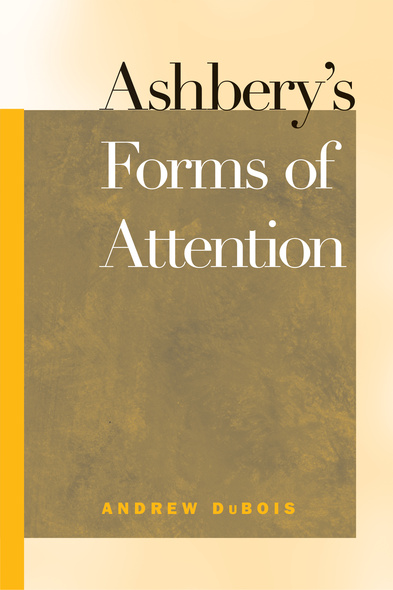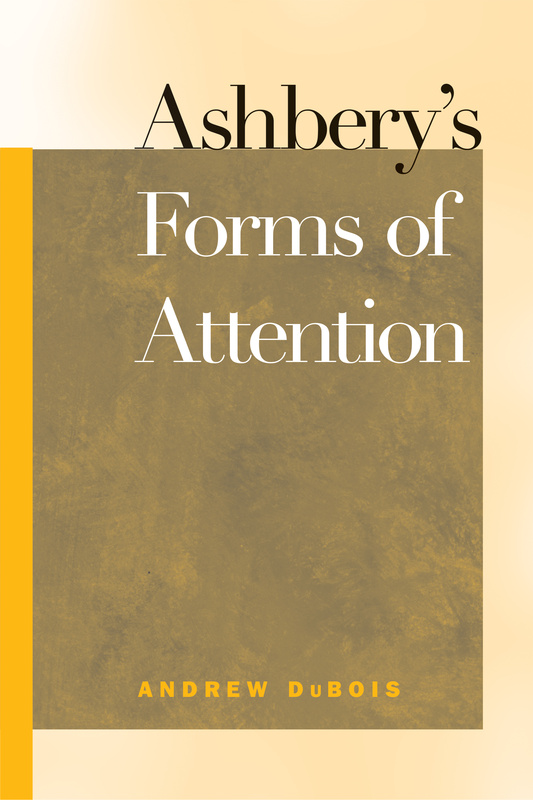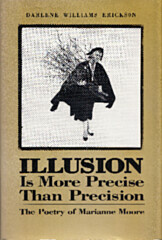A major contribution to Ashbery studies and to poetics
Andrew DuBois assesses John Ashbery’s career as a poet in the context of changes in 20th-century aesthetics, the rise of the information age, and the proliferation of aural and visual stimuli. The issue of attention, he argues, is useful not only for understanding the problems of perception and concentration in an age of information overload but also for understanding how Ashbery’s poetry and poetry in general contend with those issues.
Ashbery’s art, DuBois demonstrates, embodies the conflicts between traditional and postmodern forms of communication. The lack of traditional narrative frameworks or forms in Ashbery’s poems creates problems of attention. This strategy places a heavy burden on the reader, since Ashbery’s content—a mélange of cultural references and sympathies—defies set forms. Yet Ashbery’s concern with traditional poetic conventions is still clear in his work, and it is the tension between past and present modes of poetic discourse that best describes Ashbery’s work as a poet.
Among other subjects DuBois addresses Ashbery’s many roles—as theorist, postmodern metaphysical, and enemy of poetic decorum; his experiments in ekphrasis (poems that take other art works as their subjects); his prose; his mastery of the long form as a vehicle for extended meditation; and his use of stream-of-consciousness as a poetic strategy. In highlighting the major aesthetic and cultural impulses underlying Ashbery’s work, DuBois illuminates not only the lasting relevance of his poetry but also the larger issues of attention and perception in reading, thinking, and being in the postmodern era
Andrew DuBois assesses John Ashbery’s career as a poet in the context of changes in 20th-century aesthetics, the rise of the information age, and the proliferation of aural and visual stimuli. The issue of attention, he argues, is useful not only for understanding the problems of perception and concentration in an age of information overload but also for understanding how Ashbery’s poetry and poetry in general contend with those issues.
Ashbery’s art, DuBois demonstrates, embodies the conflicts between traditional and postmodern forms of communication. The lack of traditional narrative frameworks or forms in Ashbery’s poems creates problems of attention. This strategy places a heavy burden on the reader, since Ashbery’s content—a mélange of cultural references and sympathies—defies set forms. Yet Ashbery’s concern with traditional poetic conventions is still clear in his work, and it is the tension between past and present modes of poetic discourse that best describes Ashbery’s work as a poet.
Among other subjects DuBois addresses Ashbery’s many roles—as theorist, postmodern metaphysical, and enemy of poetic decorum; his experiments in ekphrasis (poems that take other art works as their subjects); his prose; his mastery of the long form as a vehicle for extended meditation; and his use of stream-of-consciousness as a poetic strategy. In highlighting the major aesthetic and cultural impulses underlying Ashbery’s work, DuBois illuminates not only the lasting relevance of his poetry but also the larger issues of attention and perception in reading, thinking, and being in the postmodern era
Through a chronological study of Ashbery’s work, DuBois focuses on Ashbery’s development as a poet beginning with his experiments with numerous poetic forms, his use of prose in his poetry, and his efforts at stream of consciousness. In the same way readers are easily distracted by all the assaults on their attention from constant aural and visual stimuli, so too is the poet. Ashbery’s poems are, in part, a record of the difficulty of keeping one’s attention focused on any single subject of a poem. Both the reader and the writer share the poetic journey of floating through a miasma of interruptions and distractions. Recommended.’
—CHOICE
‘Ashbery’s Forms of Attention is well conceived, critically insightful, and elegantly written. DuBois’s treatment of Ashbery’s work is theoretically sophisticated, yet largely free of jargon and obscurity.’
—John Koethe, author of Poetry at One Remove: Essays
DuBois has written a magnificent book, one that will not only make a major contribution to Ashbery criticism but also change the ways in which poetry criticism is conducted.’
—John Shoptaw, author of On the Outside Looking Out: John Ashbery’s Poetry
Andrew DuBois is assistant professor of English at the University of Toronto at Scarborough. He received his PhD in English and American Literature from Harvard University in 2003 and was the recipient of a Whiting Fellowship in the Humanities from the Mrs. Giles Whiting Foundation for 2002–2003.







